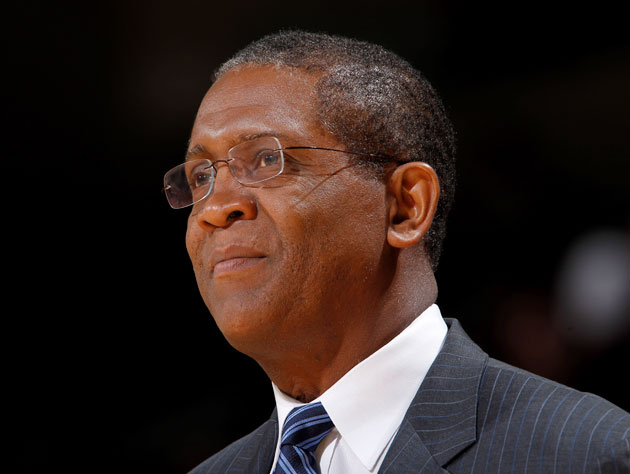When the Basketball Japan League (BJ League) was launched in 2005, the Osaka Evessa immediately peeled off three straight championships. The next four seasons were not as kind to the three-peat champs, and the franchise started off the 2012-13 campaign by losing 19 of its first 24 games.
Enter Bill Cartwright. The three-time NBA champion and former head and assistant NBA coach took over in Osaka as head coach despite knowing no Japanese, and working with precious little NBA-level talent. The BJ League includes 20 teams, and it actually directly competes with the 15-team Japan Basketball League (JBL) over the course of its season. On top of this stretched-out talent, teams are required to only play their international players (no Japanese player has won BJ league MVP, and only four Japanese players have ever made it onto the league’s All-BJ League team since 2005) limited minutes so as to encourage the homegrown talent.
Faced with these obstacles, no training camp, and a 5-19 hole to climb out of, Cartwright set to work. He described as much in a column he recently penned for Sports Illustrated:
Regardless of what language I was speaking, I knew right away the Evessa needed a lot of work. I was stunned by how little the team practiced. In the BJ League, you play a 58-game season. The games are only Saturdays and Sundays and the rest of the week is for practice, which the Evessa obviously weren't doing much of. Before I arrived, the team had Monday and Tuesdays off and only did a light walkthrough on Fridays.Not surprisingly, the team was not in good condition. I immediately changed our practice format to just Mondays off and we practiced for a minimum of 2/13 hours a day. We were basically in training camp mode the entire time I was there, something my old Knicks coach Hubie Brown would have been proud of.Cartwright, who served as head coach of the Chicago Bulls for 151 games between 2001 and 2003, fell back on a reliable go-to coaching move once ensconced in Osaka. Though he had issues with his various English-to-Japanese interpreters (“I probably went through about 10 of them. I'd say maybe three were good.”), Cartwright managed to work his team into an offensive structure that most English-to-English NBA coaches claim is too complicated to teach their stateside stars:
I decided to install the triangle offense, and, interestingly enough, the Japanese and American players were all familiar with it. The Japanese players on their own downloaded the Tex Winter triangle tape off the Internet and began poring through it. I know a lot of NBA coaches who would do anything to see that type of work ethic. Once we were able to practice and learn about the importance of post passes and letting ball movement dictate the shot, the players really took to it.I was methodical in my teachings because the Japanese players, not surprisingly, did not understand English. It was crucial to establish principles in practice because delivering orders during a game (through an interpreter) wasn't ideal. One time I told my interpreter to tell the players to push the ball, but my interpreter proceeded to speak for what seemed like 20 seconds. After that, I realized how important practice time was -- and that made for some really, really long practices.One day at practice, I was putting in a new play. The guys seemed to like it and asked what the play was called. I told them the play is called "chin" (a term used in Pete Carril's Princeton offense). As soon as I told them the name they burst out laughing. Naturally, I asked what they were laughing about. My assistant coaches came over and whispered to me that "chin" in Japanese translates to "penis". We didn't use too much Princeton terminology after that.Cartwright went on to note that his Osaka Evessa actually cobbled together a 10-game winning streak, a remarkable turn for a squad that had started the season with a 5-19 swoon. The team eventually missed out on the BJ League playoffs, but not before Cartwright both adopted to and alternately helped sway the local basketball customs (including a team-wide trip to a “leave your trunks behind” bathhouse), and fell in love with the culture.
The former Knicks, Bulls and SuperSonics center isn’t completely on board with returning to Osaka and the BJ league, though. His frustrations with interpreters (and the subsequent long practices) and homesickness (“you can only Skype so much,” Cartwright wrote) leaves his candidacy in the lurch.
It’s still a pretty remarkable turnaround for the Osaka Evessa, considering the language and culture barriers, especially thrown in without the benefit of a training camp. And Cartwright truly knows how to pen a particularly compelling column, give it a read.
|
|
|
Results 1 to 1 of 1
-
09-18-2013, 01:00 PM #1Administrator



- Join Date
- Jun 2007
- Location
- Canada
- Age
- 49
- Posts
- 60,896
- Blog Entries
- 3
- Downloads
- 9
- Uploads
- 12429
 Bill Cartwright details his whirlwind turn as head coach of the Osaka Evessa in Japan
Bill Cartwright details his whirlwind turn as head coach of the Osaka Evessa in Japan
Similar Threads
-
Being a boxing trainer/fitness coach in Japan?
By My SON in forum Travel and VacationReplies: 0Last Post: 10-04-2009, 03:09 AM -
Going to Japan/Osaka. WHAT DO I DO THERE?
By Anna P in forum Travel and VacationReplies: 1Last Post: 09-12-2009, 03:15 AM -
Which rookie head coach will do the best next season?
By Johnny in forum IntroductionsReplies: 11Last Post: 06-21-2009, 06:46 AM -
Which rookie head coach will do the best next season?
By Johnny in forum IntroductionsReplies: 0Last Post: 06-18-2009, 10:25 PM -
You are the head coach of a expansion team. These are the only qb's
By Throwback in forum Sports ClubReplies: 0Last Post: 12-17-2007, 04:07 PM






 Reply With Quote
Reply With Quote
Bookmarks